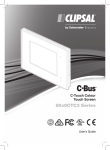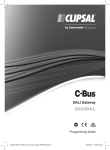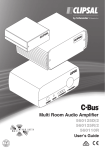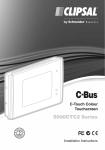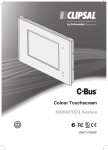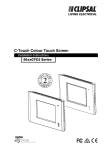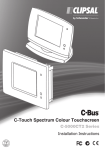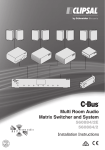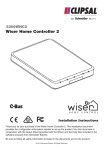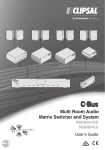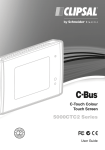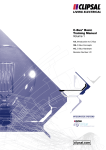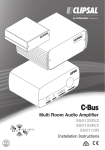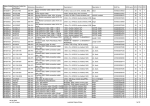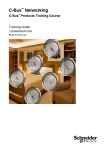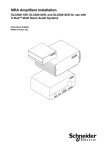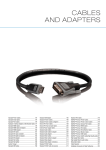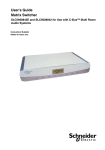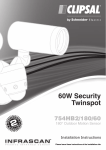Download Clipsal 5000CTC3 Series Specifications
Transcript
C-Touch Colour Touch Screen 50x0CTC3 Series Installation Instructions 50x0CTC3 Series C-Touch Colour Touch Screen Installation Instructions Contents 1.0 Product Description ........................................................................................3 1.1 Features and Capabilities ..........................................................................3 1.2 Infrared Remote Control ............................................................................6 1.3 Definitions ..................................................................................................6 2.0 Safety and Product Handling .........................................................................7 3.0Installation ......................................................................................................7 3.1 Location .....................................................................................................7 3.2 Multiple Touch Screen Units ......................................................................8 3.3 Mounting Instructions ................................................................................9 3.4 Attaching and Removing the Fascia ........................................................13 4.0 Wiring Details ................................................................................................15 4.1 C-Bus Network Connection .....................................................................15 4.2 Audio and IR Connections .......................................................................16 4.3 Power Supply Connection ........................................................................16 4.4 USB Connections.....................................................................................17 4.5 RS232 Serial Connection ........................................................................17 4.6 Wired LAN Connection ............................................................................18 4.7 Keyboard Connections .............................................................................18 4.8 Programming Lead ..................................................................................18 5.0 C-Bus Programming Requirements ............................................................19 6.0 Using the C-Touch Colour Utility ................................................................20 7.0 Reset Button .................................................................................................26 8.0Specifications ...............................................................................................27 8.1 Touch Screen Specifications ....................................................................27 8.2 Touch Screen Dimensions .......................................................................28 8.3 Infrared Remote Control ..........................................................................29 8.4 Power Supply ...........................................................................................29 8.5 Mounting Accessories .............................................................................30 9.0 Standards Complied .....................................................................................31 10.0 Two-Year Warranty ........................................................................................32 © Copyright 2012. Schneider Electric Australia Pty Ltd. All rights reserved. The information in this document is provided in good faith. Schneider Electric Australia Pty Ltd has endeavoured to ensure the relevance and accuracy of the information, but assumes no responsibility for any loss incurred as a result of its use. Schneider Electric does not warrant that the information is fit for any particular purpose, nor does it endorse its use in applications that are critical to the health or life of any human being. Schneider Electric reserves the right to update the information at any time without notice. C-Bus, Clipsal, C-Touch and HomeGate are trademarks of Schneider Electric Industries SAS. All other trademarks are the property of their respective owners. April 2012 © 2012 Schneider Electric. All Rights Reserved. 50x0CTC3 Series C-Touch Colour Touch Screen Installation Instructions 1.0 Product Description The C-Bus C-Touch Colour Touch Screen provides sophisticated control of an entire system from one location. Using the appropriate software, you can: • configure the screens (pages) for convenience of use • control devices, scenes and schedules • configure an audible alarm • display video from a camera connected to the local LAN. Several fascia colour and style options are available. Contact your local sales representative for more information. The touch screen, parts and accessories are listed in Table 1. Catalogue Number Description 50x0CTC3 Colour 6.4” backlit LCD touch screen, wall-mount, base unit for use with Saturn or Neo front fascia. Parts Package: stylus, microfibre cleaning cloth, mounting screws, RJ45 plugs and a programming cable (included parts) 5035TX2 C-Bus infrared remote control, 5-button (included part). Accessories, Ordered Separately 5100PS24/2700-AU Power supply, 24V d.c., 2.7A, 65W, 100-240V a.c., with AC power cord and adapter cable. 5000CTCWB Wall box, for masonry, brick or timber/metal framed stud walls. 5000CTCNA Nail bracket, for screw or nail attachment to a wall frame. 5000CTCRM Plasterboard bracket. Table 1. Colour touch screen, parts and accessories 1.1 Features and Capabilities The colour touch screen is a wall-mounted unit available with several fascia styles and colours. Mounting brackets are available for a variety of mounting conditions. The colour touch screen includes an infrared (IR) window for remote control interface and a hand held C-Bus remote control. To program the touch screen, a PC is connected to the LAN interface, located behind the fascia. The unit can also be programmed via a normal LAN connection on the rear panel. Clipsal Toolkit and PICED configuration software tools are downloaded from the Clipsal website. Projects are created using PICED and are transferred to the touch screen. © 2012 Schneider Electric. All Rights Reserved. 3 of 36 50x0CTC3 Series C-Touch Colour Touch Screen Installation Instructions The touch screen is powered by the power supply listed in Table 1. The touch screen does not supply power to the C-Bus network. An internal battery maintains the time and date settings. The touch screen’s processor automatically controls the contrast and brightness of the screen as well as backlight level control. By setting access levels and passwords, you can set up the touch screen to restrict access to touch screen functions. Figure 1 shows the features of the front side of the unit. Figure 2 shows the features of the back panel. Touch screen Front fascia Figure 1. Front panel features. Figure Reference 4 of 36 Description 1 Power on/off indicator LED 2 Programming connector (RJ45) 3 Reset pushbutton 4 Infrared remote control window 5 Light level sensor © 2012 Schneider Electric. All Rights Reserved. 50x0CTC3 Series C-Touch Colour Touch Screen Installation Instructions DC IN + - Figure 2. Back panel connection points. Figure Reference Connections and Features Description 1 Ethernet LAN RJ45 2 Memory card Compact Flash 3 C-Bus network 2 x RJ45 4 Serial interface DE9 5 IR control input 3.5mm mono jack 6 Audio line input 3.5mm stereo jack 7 Audio line output 3.5mm stereo jack 8 USB 2 x USB A 9 Power supply 2-terminal plug 10 Keyboard PS/2 © 2012 Schneider Electric. All Rights Reserved. 5 of 36 50x0CTC3 Series C-Touch Colour Touch Screen Installation Instructions 1.2 Infrared Remote Control The touch screen is supplied with an infrared remote control that is used to trigger scenes, switch loads and adjust lighting levels. The remote control functions are incorporated into a software project. During programming, the functions available to the remote control are set. If multiple touch screen units are installed, the same remote control can talk to each of them. Figure 3. Infrared (IR) remote control. 1.3 Definitions Term Definition Load An electrical device (such as a light) connected to a C-Bus output unit (such as a dimmer). Scene A series of actions across multiple outputs, triggered by a single button. For example, on arrival home, you could use a scene to switch on lights in the hallway, kitchen and lounge, and switch on a heater. Schedule A sequence of events set to occur at particular times in the future. Backlight The light behind the LCD screen providing visibility in varying lighting conditions. 6 of 36 © 2012 Schneider Electric. All Rights Reserved. 50x0CTC3 Series C-Touch Colour Touch Screen Installation Instructions 2.0 Safety and Product Handling Be aware of the following information during installation: • The touch screen and its power supply are for indoor use only. • Use only the approved power supply with the touch screen (see Table 1). • Do not connect the C-Bus cables to any other network. Damage to the equipment will occur. • Allow adequate ventilation. Do not block the air vents at the top of the unit. • Using any non-C-Bus software on the touch screen without the written consent of Clipsal or Schneider Electric may void the unit’s warranty. • Do not overtighten the mounting screws. The case might distort and cause problems installing the front fascia. • Do not megger test the touch screen or the C-Bus network cables. • Use only the cleaning cloth provided to clean the screen. 3.0 Installation When installing the touch screen, be careful not to scratch or otherwise damage the plastic parts. Do not wipe the screen with anything other than the a clean soft cloth. Refer to the User’s Guide for care instructions. 3.1 Location It is important to select the right location for the touch screen. Follow these guidelines when choosing a location for the unit: • Choose a location away from direct sunlight or bright lights that will cause unwanted reflections. • Avoid damp or humid locations or places where water might drip on the touch screen. • Provide a clear area in front of the touch screen for reception of signals from the infrared remote control. • The touch screen viewing angle is shown in Figure 4. • Do not install the touch screen near sources of heat, such as hot air vents or heaters. © 2012 Schneider Electric. All Rights Reserved. 7 of 36 50x0CTC3 Series C-Touch Colour Touch Screen Installation Instructions 60˚ up 70˚ left 60˚ down 70˚right Figure 4. Touch screen viewing angles. 3.2 Multiple Touch Screen Units Multiple touch screen units may be installed on a C-Bus network. These units may be programmed to operate cooperatively or independently of each other. Take care not to mount units where a single IR remote control transmission can be received by multiple units (see Figure 5). Otherwise, multiple units may trigger a scene with unpredictable results. Figure 5. Take care not to overlap remote control reception zones. 8 of 36 © 2012 Schneider Electric. All Rights Reserved. 50x0CTC3 Series 3.3 C-Touch Colour Touch Screen Installation Instructions Mounting Instructions There are three options for mounting the touch screen: • in plasterboard walls using a plasterboard bracket • in stud walls (such as timber frame internal walls) using a nail bracket • in solid walls (such as brick or stone) or stud walls using a wall box Plasterboard Bracket The C-Touch Colour Plasterboard Bracket (catalogue number 5000CTRM) provides a means of mounting the touch screen in a plasterboard wall. In order to install the bracket, there must be an empty space behind the plasterboard that is 310mm wide and 65mm deep. This space is required to insert and rotate the bracket. The opening for the bracket is 208mm wide and 162mm high. Figure 6. Plasterboard bracket installation To install the plasterboard bracket: 1. Cut out a 208mm x 162mm hole in the plasterboard. 2. Drill four 4mm holes in the plasterboard to provide clearance for the screws that secure the touch screen. 3. Using the four short screws provided, attach the side clamps to the bracket body. Do not tighten the screws at this time. 4. Insert the bracket in the cut out hole (see Figure 6) and then rotate the bracket inside the wall cavity until it matches the cut out. © 2012 Schneider Electric. All Rights Reserved. 9 of 36 50x0CTC3 Series C-Touch Colour Touch Screen Installation Instructions 5. Place the side clamps so that they clamp the bracket to the plasterboard and then tighten the side clamp screws. 6. Connect the cables to the back of the touchscreen. Refer to the wiring instructions. 7. Carefully place the touch screen in the bracket and use the four long screws to fasten the unit in place. Nail Bracket The C-Touch Colour Nail Bracket, catalogue number 5000CTCNA, is used where it is practical to nail or screw the bracket to a wall frame. Figure 7. Nail Bracket To mount the touch screen using the nail bracket do the following: 1. Prior to cladding the wall, use nails or screws to firmly attach the nail bracket to the wall frame. 2. Feed the cables through the nail bracket. Refer to Figure 8. The use of conduit is recommended. The positioning of cables will vary depending on the installation. After the wall cladding is installed, perform steps 3 and 4. 3. Hold the touch screen up to the bracket and connect the cables. Refer to wiring instructions in this document. 4. Place the unit in the bracket and use the four screws provided to fasten the unit in place. Do not overtighten the screws. 10 of 36 © 2012 Schneider Electric. All Rights Reserved. 50x0CTC3 Series C-Touch Colour Touch Screen Installation Instructions Figure 8. Nail bracket installation detail Wall Box The C-Touch Colour Wall Box, catalogue number 5000CTCWB, allows the touch screen to be mounted in a solid wall construction such as brick or stone. It provides better RF shielding than the nail bracket. The wall box may also be used to mount the touch screen in timber or metal-frame stud walls. Note: If you use an optional Wi-fi adapter (not provided), the device must be placed outside of the wall box for proper reception. During installation, use a USB extension cable and pass the adapter through one of the holes in the wall box. Figure 9. Wall box © 2012 Schneider Electric. All Rights Reserved. 11 of 36 50x0CTC3 Series C-Touch Colour Touch Screen Installation Instructions Figure 10. Wall box installation To mount the touch screen in the wall box, do the following: 1. Before rendering or plastering, attach the wall box to masonry or a beam of the wall framing. 2. Feed the signal and power cables through the holes in the wall box. The use of conduit is recommended (refer to Figure 10). 3. After the wall is rendered or plastered and a hole is provided for the touch screen, hold the touch screen near the wall box and plug in the cables into the unit. 4. Attach the touch screen to the wall box using the 4 screws provided. Make sure that the cables are clear of the mounting screws. Do not overtighten the screws. Figure 11. 4 screws hold the touch screen in place. 12 of 36 © 2012 Schneider Electric. All Rights Reserved. 50x0CTC3 Series C-Touch Colour Touch Screen Installation Instructions 3.4 Attaching and Removing the Fascia The following steps are illustrated in Figure 12. To attach the fascia: 1. Position the fascia over the touch screen, with the IR and indicator windows on the right hand side. Ensure that the clips on the left underside of the fascia are positioned slightly to the left of the matching clips on the touch screen. 2. While applying forward pressure on the left side of the fascia (toward the touch screen), push the left side to the right. You should feel the clips slot into each other. 3. Push the right side of the fascia forward and to the right until the clip on the underside snaps into place. Position the fascia Clips Forward pressure Push to the right Push forward and to the right Figure 12. Attaching the fascia. © 2012 Schneider Electric. All Rights Reserved. 13 of 36 50x0CTC3 Series C-Touch Colour Touch Screen Installation Instructions To remove the fascia: 1. Grasp the right side of the fascia with your left hand. 2. Push the release lock in with your right thumb. At the same time lift the right side of the fascia plate off and to the right with your left hand (to disengage the clip). 3. Swing the fascia off towards the left. Refer to Figure 13. Push the release lock Lift off and to the right to disengage the clip, then swing to the left Figure 13. Removing the fascia. 14 of 36 © 2012 Schneider Electric. All Rights Reserved. 50x0CTC3 Series C-Touch Colour Touch Screen Installation Instructions 4.0 Wiring Details All of the wired cable connections to the touch screen use quick disconnecting type plugs. Be sure to connect the cables to the correct locations before installing the touch screen in its mounting bracket with the four mounting screws. 4.1 C-Bus Network Connection Caution The C-Bus network must not be connected to any other type of network. Make certain that only the C-Bus network cable is inserted in the C-Bus RJ45 connectors. Improper connection will cause damage to the equipment. Two RJ45 connectors are located on the back panel for C-Bus network connection. This allows the touch screen to be placed anywhere on the network. Use Cat.5e Unshielded Twisted Pair (UTP) cable. Catalogue numbers are 5005C305B (solid) and 5005C305BST(stranded). The pin assignments for the cable conductors are shown in Table 2 Pin C-Bus Connection Colour 1 Remote ON green & white 2 Remote ON green 3 C-Bus Negative (-) orange &white 4 C-Bus Positive (+) blue 5 C-Bus Negative (-) blue & white 6 C-Bus Positive (+) orange 7 Remote OFF brown & white 8 Remote OFF brown 87654321 87654321 Table 2. RJ45 cable conductors for C-Bus. C-Bus network cables must be kept separate from mains cabling. To avoid problems caused by induced electromagnetic noise, never run the network cable parallel to mains wiring or place the cable inside a conduit that contains mains conductors. © 2012 Schneider Electric. All Rights Reserved. 15 of 36 50x0CTC3 Series 4.2 C-Touch Colour Touch Screen Installation Instructions Audio and IR Connections If the touchscreen will use the audio input, audio output (3.5mm stereo sockets) and IR input (3.5mm mono socket) connections, it is important to use shielded cables and to keep the cables away from building power wiring or sources of interference such as lamp ballasts or motors. Figure 14. Audio and IR cable plugs 4.3 Power Supply Connection A building power outlet is required for the supply. Several international cords are supplied with the power supply for use in various locations. If possible, feed the d.c. output cable to the touchscreen through conduit to minimise possible damage to the cable. Attach signal cables before connecting power to the touch screen. Provide adequate ventilation for the power supply. Do not cover the power supply unit or place it in a small enclosed space or in insulation. Mounting bracket + Positive (dot) AC power cord Adapter cable - Negative Figure 15. Power supply and adapter. 16 of 36 © 2012 Schneider Electric. All Rights Reserved. 50x0CTC3 Series 4.4 C-Touch Colour Touch Screen Installation Instructions USB Connections One or two optional USB devices can be installed in the sockets on the rear panel. Using a USB extension cable is recommended for all devices. When using extension cables, place any USB devices outside of the metal box (see Figure 16). USB extension Adapter Figure 16. USB device and extension cable. To install the adapter, follow these steps: 1. Install optional USB devices in one of the USB sockets on the back panel. 2. In applications using a wall box or nail bracket, a Wi-fi adapter requires an extension cable and must be placed outside the box for proper reception. 3. When using an extension, attach the cable to the back of the touch screen and allow excess cable to lie loose in the wall cavity. 4.5 RS232 Serial Connection The RS-232 serial port connection uses standard EIA 574 pinouts (see Table 3). The RS-232 port lets you to connect external devices such as security and control equipment. Be sure to use a suitable shielded data cable. The cable length should be limited to 15 metres for communication up to 19,200 bps, or 7.5 metres at 38,400 bps. Pin 12 3 4 5 6789 Name Description 1 DCD Data Carrier Detect 2 RD Receive Data 3 TD Transmit Data 4 DTR Data Terminal Ready 5 GND Ground 6 DSR Data Set Ready 7 RTS Request to Send 8 CTS Clear to Send 9 RI Ring Indicator Table 3. RS232 Serial Interface © 2012 Schneider Electric. All Rights Reserved. 17 of 36 50x0CTC3 Series 4.6 C-Touch Colour Touch Screen Installation Instructions Wired LAN Connection Caution The Ethernet LAN network cable must not be connected to the C-Bus cable connector on the back panel. The two networks are not electrically compatible and improper connection will cause damage to the equipment. The 5000CTC3 touch screen supports a wired Ethernet LAN connection at the rear panel. The connection method used is a matter of choice. A wired LAN connection requires a switch/hub or router, not supplied by Clipsal. Be sure to use high quality Cat.5e cable for the LAN connection. Conduit is recommended. Do not run network cables near mains power cables or near sources of interference such as light fixtures or transformers. 4.7 Keyboard Connection You can connect a keyboard to the touchscreen for configuration and support purposes. The connection is not intended to be permanent. You can use either of thefollowing methods to connect a keyboard: PS/2 Port The keyboard may be connected directly to the PS/2 port. USB Ports You can connect a USB keyboard to either of the USB ports on the back panel. Use care when the touch screen is not firmly attached to the mounting box or bracket. After completing the programming tasks, be sure to securely attach the touchscreen and install the front fascia. 4.8 Programming Lead A programming lead is provided with the touch screen. It consists of a Cat.5e crossover Ethernet patch cable. Use the crossover programming lead when connecting directly from a PC to the touch screen. If connecting through a network hub or switch, you will need to use a standard Ethernet cable. Cable conductor assignments for a crossover Ethernet cable are shown in Table 4. 12345678 Connection A Connection B 1 3 Colour Green/White 2 6 Green 3 1 Orange/White 4 4 Blue 5 5 Blue/White 6 2 Orange 7 7 Brown/White 8 8 Brown Table 4. Wiring assignments for a crossover Ethernet patch cable. 18 of 36 © 2012 Schneider Electric. All Rights Reserved. 50x0CTC3 Series C-Touch Colour Touch Screen Installation Instructions 5.0 C-Bus Programming Requirements Unit Address The touch screen must be programmed with a unique identification address (unit address). This is accomplished using C-Bus Toolkit software, available from the Downloads section of the Clipsal Integrated Systems (CIS) web site at: http://www.clipsal.com/cis. System Clock and Burden C-Bus Toolkit is also used to enable the system clock and burden, if required. The unit incorporates a software selectable C-Bus system clock that is used for synchronizing data commmunications on the network. A maximum of three enabled system clocks should exist on a network, so the system clock on the touch screen is disabled by default. Colour Touch Screen Project The touch screen must be configured for a particular C-Bus installation with a project that has been produced using the Programming Interface for C-Bus Embedded Devices (PICED) software. PICED software is available from the Downloads section of the CIS web site. Documentation and Help files are included with the software. After you have produced a project, select the ‘Transfer Project To C-Touch Colour’ option located in the Transfer drop down menu. The C-Touch Colour Transfer Utility software sends the project to the unit via the Ethernet LAN. The utility is included with PICED software and allows you to perform various configuration functions, such as setting the time. The installer should make copies of the Toolkit and PICED project files and also give a copy to the customer. © 2012 Schneider Electric. All Rights Reserved. 19 of 36 50x0CTC3 Series C-Touch Colour Touch Screen Installation Instructions 6.0 Using the C-Touch Colour Utility The C-Touch Colour Transfer Utility transfers a software project to the touch screen. The utility is included with PICED software that is available from the Downloads section of the CIS web site: http://www.clipsal.com/cis. This section takes you through the process of installing a project on the C-Touch touch screen using a direct Ethernet connection. It is also possible to install projects to multiple C-Touch touch screen units via a common DHCP network, or a network where each touch screen has been configured with a unique static IP Address. 1. After the touch screen has been installed and switched on, the default screen appears (see Figure 17). You must configure the unit with an IP address and a customised project file before the touch screen is ready for use. Figure 17. The initial screen of an unconfigured colour touch screen 20 of 36 © 2012 Schneider Electric. All Rights Reserved. 50x0CTC3 Series C-Touch Colour Touch Screen Installation Instructions 2. If your PC and the touch screen are both connected to a common Ethernet network, start the C-Touch Transfer Utility by clicking the C-Touch Transfer Utility in the PICED folder in the windows start menu, or select ‘Transfer to Unit’ in PICED‘s Transfer menu and continue to Step 11. If both devices are not connected to a common network, continue with Step 3. 3. Remove the fascia if it has been fitted to the unit. 4. Plug the supplied programming lead (red crossover cable) into the RJ45 socket on the front right side of the touch screen. 5. Ensure that your PC is switched on and plug the other end of the crossover cable into the Ethernet socket on your PC. 6. Start the C-Touch Transfer Utility by clicking the C-Touch Transfer Utility in the PICED folder in the windows start menu, or select ‘Transfer to Unit’ in PICED‘s Transfer menu. 7. If your PC has multiple network adapters (that are enabled), you see a list of available network devices. If the screen is not displayed, click Select Network Adapter from the Search menu. Select the network adapter where the patch cable is connnected and Click OK (see Figure 18). Figure 18. Select the network adapter used to connect to the C-Touch Colour © 2012 Schneider Electric. All Rights Reserved. 21 of 36 50x0CTC3 Series C-Touch Colour Touch Screen Installation Instructions 8. You will be asked to select the type of network. Select Direct Connect and then click OK (see Figure 19). Figure 19. Select the network connection type 9. The transfer utility software will suggest an IP Address for the touch screen (see Figure 20). Click Next to attempt to set the IP Address for the touch screen that is connected to your PC. You will be asked to confirm the suggested IP Address on the touch screen. Figure 20. An IP Address will be suggested for the touch screen 22 of 36 © 2012 Schneider Electric. All Rights Reserved. 50x0CTC3 Series C-Touch Colour Touch Screen Installation Instructions 10. You will now see the touch screen unit listed in the transfer utility (see Figure 21). Figure 21. List of touch screens located by the search 11. Select the touch screen to be configured. The screen provides information about the selected touch screen (see Figure 22). Figure 22. Touch screen information screen 12. If there is a firmware update for your touch screen, you will be prompted to update before you are allowed to change the project or other settings. © 2012 Schneider Electric. All Rights Reserved. 23 of 36 50x0CTC3 Series C-Touch Colour Touch Screen Installation Instructions 13. Click the Transfer tab to select the transfer page. The transfer options allow you to transfer a project to the touch screen or transfer a project or log file to your PC. 14. Select the button for the Transfer Project to C-Touch Colour. Choose the project that was created for this touch screen installation. Then press Start to begin the transfer process. It may take several minutes for the transfer to complete. An information screen tells you that the transfer was sucessful (see Figures 23 and 24). Figure 23. Choosing the type of transfer to be done Figure 24. The project has been successfully transferred to the touch screen 24 of 36 © 2012 Schneider Electric. All Rights Reserved. 50x0CTC3 Series C-Touch Colour Touch Screen Installation Instructions 15. Click the Control tab to select the Control page. From the control screen, you can take a screen grab of the touch screen and change the name that identifies the touch screen over the Ethernet connection (see Figure 25). Figure 25. Changing the name of the C-Touch Colour unit Figure 26. Confirming the name change Note: Using the touch screen on a network is similar to direct connection. You might need the assistance from a network administrator. © 2012 Schneider Electric. All Rights Reserved. 25 of 36 50x0CTC3 Series C-Touch Colour Touch Screen Installation Instructions 7.0 Reset Button In the event that the C-Touch Colour software becomes unresponsive, you can reset the touch screen by pressing the reset button. The reset button is located to the right of the display, beneath the fascia (see Figure 27). Instructions for removing the fascia are provided earlier in this document. Fascia release latch Reset button IR sensor Light sensor Figure 27. The reset button is located underneath the fascia 26 of 36 © 2012 Schneider Electric. All Rights Reserved. 50x0CTC3 Series C-Touch Colour Touch Screen Installation Instructions 8.0Specifications 8.1 Touch Screen Specifications Parameter Description Power supply rating 24V d.c., 2.7A, class 2 Display type 16.3cm (6.4 in.) TFT Colour Active Matrix LCD Display resolution 640 x 480 pixels Display luminance 600 cd/m² minimum Display contrast ratio >400:1 Viewing angle Left and right: 70°, up: 60°, down: 60° Touch surface durability 35 touches in any one location, 1 million slide touches C-Bus supply voltage 15 to 36V d.c. @ 20mA required for normal operation. Does not provide current for the C-Bus network. C-Bus control functions Load switching and dimming, scene control and scheduling C-Bus connection 2 x C-Bus RJ45 (parallel) C-Bus system clock Software selectable Other connections USB type A x 2 Ethernet, RJ45 x 2, one front and one back Serial interface, DE9 Audio line IN, 3.5mm stereo Audio line OUT, 3.5mm stereo Infrared IN, 3.5mm mono Keyboard, PS/2 or USB Power, 2-pin screw terminal, quick disconnect Operating temperature range -5 to 45°C (23 to 113°F) Operating humidity range 5 to 90% RH (non-condensing) Weight, base unit 1254g (excluding fascia) © 2012 Schneider Electric. All Rights Reserved. 27 of 36 50x0CTC3 Series 8.2 C-Touch Colour Touch Screen Installation Instructions Touch Screen Dimensions Parameter Description Dimensions (W x H x D) 246 x 173 x 72.5mm (excluding fascia) Protrusion from wall 23.5mm (including fascia) Mounting depth (into wall) 54mm Mounting centres (H x V) 212.5 x 112mm 24 6 mm 202 mm 18.5 mm 54 mm 158 mm 173 mm 234 mm Note: 28 of 36 The touch screen in this example has a bevelled glass fascia. © 2012 Schneider Electric. All Rights Reserved. 50x0CTC3 Series 8.3 C-Touch Colour Touch Screen Installation Instructions Infrared Remote Control The 5035TX2 5-button remote control is supplied with the touch screen. You may purchase the 8-button version, if desired. Both types are described in the following table. Parameter Description Supply voltage 3V d.c. battery powered. Transmission range reduces with decreasing battery voltage. Battery Lithium battery (CR2025, or equivalent) Battery shelf life Approximately 10 years Infrared transmission range Approximately 8m at 90°, or 4m at 60° to the touch screen Control functions 5035TX2: 5 membrane buttons including master off. Also up and down button 5038TX2: 8 membrane buttons including master off. Also up and down buttons Dimensions (W x H x D) 86 × 54 × 8mm Weight 28g Colour White The 5035TX2 remote control is supplied with the touch screen. The 5038TX2 can be purchased separately. 8.4 Power Supply Parameter Description Catalogue number 5100PS24/2700-AU Input voltage 100 to 240V a.c., 50 or 60Hz Output rating 24V d.c., 2.7A, 65W Operating temperature range -5 to 50°C (23 to 122°F) The specified power supply must be used. Failure to do so will void the warranty. © 2012 Schneider Electric. All Rights Reserved. 29 of 36 50x0CTC3 Series 8.5 C-Touch Colour Touch Screen Installation Instructions Mounting Accessories Plasterboard Bracket Parameter Description External dimensions (W x H x D) 261 x 200 x 44mm Cut-out dimensions (W x H) 208 x 162mm Required cavity clearance 310 x 310 x 65mm Weight 296g Nail Bracket Parameter Description External dimensions (W x H x D) 287 x 215 x 47mm Cut-out dimensions (W x H) 205 x 162mm Weight 530g Wall Box Parameter Description External dimensions (W x H x D) 224 x 167 x 68mm Cut-out dimensions (W x H x D) 219 x 162 x 67mm Weight 667g 30 of 36 © 2012 Schneider Electric. All Rights Reserved. 50x0CTC3 Series C-Touch Colour Touch Screen Installation Instructions 9.0 Standards Complied Declarations of Conformity Australian/New Zealand EMC & Electrical Safety Frameworks and Standards Regulation Standard Title Safety AS/NZS 60950-1 Information Technology Equipment-Product Safety EMC AS/NZS CISPR22 Information Technology Equipment-- (Class B) Radio Disturbance Characteristics European Directives and Standards Directive Standard Title EMC Directive CISPR 22, EN Information Technology Equipment-- 2004/108/EC 55022 (Class B) Radio Disturbance Characteristics CISPR 24, Information Technology Equipment-- EN 55024 Immunity Characteristics EN 60950-1 Information Technology Equipment Low Voltage Directive 2006/95/EC RoHS Directive Reduction of Hazardous Substances 2011/65/EU Other International Standards Standard Title IEC 60950-1 Information Technology Equipment -- Safety CISPR 22 Information Technology Equipment -- Radio disturbance characteristics -- Limits and methods of measurement CISPR 24 Information Technology Equipment -- Immunity characteristics -- Limits and methods of measurement US FCC Regulations Regulation Title FCC Title 47 Part 15, Subpart B, Class B Digital Device This device complies with part 15 of the FCC rules. Operation is subject to the following two conditions: (1) this device may not cause harmful interference, and (2) this device must accept any interference received, including interference that may cause undesirable operation. (continued on next page) © 2012 Schneider Electric. All Rights Reserved. 31 of 36 50x0CTC3 Series C-Touch Colour Touch Screen Installation Instructions US FCC Regulations (continued) Class B Product Note: This equipment has been tested and found to comply with the limits for a Class B digital device, pursuant to Part 15 of the FCC Rules. These limits are designed to provide reasonable protection against harmful interference in a residential installation. This equipment generates, uses and can radiate radio frequency energy and, if not installed and used in accordance with the instructions, may cause harmful interference to radio communications. However, there is no guarantee that interference will not occur in a particular installation. If this equipment does cause harmful interference to radio or television reception, which can be determined by turning the equipment off and on, the user is encouraged to try to correct the interference by one or more of the following measures: • Reorient or relocate the receiving antenna. • Increase the separation between the equipment and receiver. • Connect the equipment into an outlet on a circuit different from that to which the receiver is connected. • Consult the dealer or an experienced radio/TV technician for help. Changes or modifications to this device that are not expressly approved by Schneider Electric (Australia) Pty Ltd could void the user’s authority to operate the equipment. Underwriters Laboratories 32 of 36 UL60950-1 Information Technology Equipment CSA 22.2 Information Technology Equipment -- Safety © 2012 Schneider Electric. All Rights Reserved. 50x0CTC3 Series C-Touch Colour Touch Screen Installation Instructions 10.0 Two-Year Warranty The 5000CTC3 Series C-Touch Colour Touch Screen carries a two-year warranty against manufacturing defects. Warranty Statement The benefits conferred herein are in addition to, and in no way shall be deemed to derogate, either expressly or by implication, any or all other rights and remedies in respect to the Clipsal by Schneider Electric product, that the consumer has in the location where the product is sold. The warrantor is Schneider Electric (Australia) Pty Ltd, a member of Schneider Electric Industries SAS, with offices worldwide. This Clipsal by Schneider Electric product is guaranteed against faulty workmanship and materials for a period of two (2) years from the date of purchase. Schneider Electric (Australia) Pty Ltd reserves the right, at its discretion, to either repair free of parts and labour charges, replace or offer refund in respect to any article found to be faulty due to materials, parts or workmanship. This warranty is expressly subject to the Clipsal by Schneider Electric product being installed, wired, tested, operated and used in accordance with the manufacturer’s instructions. Any alterations or modifications made to the product without permission of Schneider Electric (Australia) Pty LTD might void the warranty. Schneider Electric (Australia) Pty Ltd shall meet all costs of a claim. However, should the product that is the subject of the claim be found to be in good working order, all such costs shall be met by the claimant. When making a claim, the consumer shall forward the Clipsal by Schneider Electric product to the nearest Clipsal by Schneider Electric office. Provide adequate particulars of the defect within 28 days of the fault occurring. The product should be returned securely packed, complete with details of the date and place of purchase, description of the load and circumstances of the malfunction. For all warranty enquiries, contact your local Clipsal by Schneider Electric Sales Office. The address and contact number can be found at the web site: www.clipsal.com/locations or by telephoning 1300 722 247, the CIS Technical Support Hotline (Australia only). © 2012 Schneider Electric. All Rights Reserved. 33 of 36 50x0CTC3 Series C-Touch Colour Touch Screen Installation Instructions Notes: 34 of 36 © 2012 Schneider Electric. All Rights Reserved. 50x0CTC3 Series C-Touch Colour Touch Screen Installation Instructions Notes: © 2012 Schneider Electric. All Rights Reserved. 35 of 36 Technical Support For further assistance in using this product, consult your nearest Clipsal Integrated Systems (CIS) Sales Representative or Technical Support Officer. Technical Support Contact Numbers Australia 1300 722 247 (CIS Technical Support Hotline) New Zealand 0800 888 219 (CIS Technical Support Hotline) United States 1 888 778 2733 [email protected] Technical Support email: [email protected] Schneider Electric (Australia) Pty Ltd Contact us: clipsal.com/feedback National Customer Care Enquiries: Tel 1300 2025 25 Fax 1300 2025 56 F2337/01 Schneider Electric (Australia) Pty Ltd reserves the right to change specifications, modify designs and discontinue items without incurring obligation and whilst every effort is made to ensure that descriptions, specifications and other information in this catalogue are correct, no warranty is given in respect thereof and the company shall not be liable for any error therein. © 2012 Schneider Electric. All Rights Reserved. Trademarks are owned by Schneider Electric Industries SAS or its affiliated companies. CLIPCOM Mar 2012




































